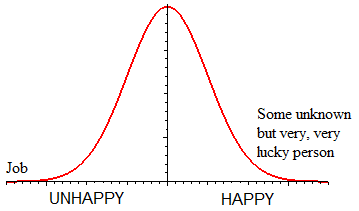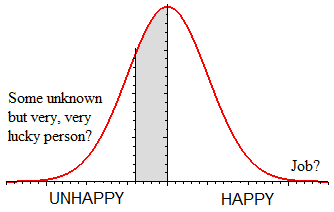
Graph One
Normal distribution of happiness in the world.
Dear Amritsar,
Why am I so happy?
Hey, Babe,
Sheer dumb luck.
Dear Amritsar,
Could you possibly elaborate on that?
Hey, Babe,
You want to test your luck? Sure.
Most people would like to believe that if they just find the right formula (the right mate, the house, the car, the religion that doesn't get in the way of what they really want to do), they will be happy. Experience - the one true enemy of happiness - suggests that the situation is more complicated.
Bill Gates is the richest man in the world - do you think he is happy? Well, probably. But a lot of people on the Forbes 500 aren't - so what has wealth brought them? On the other hand, the woman you see on the street corner eating a shoe could very well be happier than any of them. Her happiness may be delusional, but recognizing that would only lead us to question the nature of happiness, and science would be of no help to us in that discussion, so let's take her happiness at face value.Researchers at the Poynter Sisters Institute's Happiness Research Project have been studying the happiness of people throughout the world for decades. And, what they have found may astound you. (But, it probably won't. I really should stop watching CNN before I write my column.) What they have found is that happiness is distributed randomly throughout the world without regard to race, class, family income before height is taken into account, shoe size, eye colour or average precipitation, including rain and snow but not sleet or hail, compared to the base precipitation of 1979 (see: Graph One).
"Frankly, I was astounded," admitted Hoopy Hobgoblin, lead researcher of the Poynter Sisters Institute's study, "and I don't watch CNN. I would have thought that being married to Angelina Jolie - the most beautiful woman in the world - would have guaranteed a man's happiness. Who knew?"

Happiness follows the normal distribution curve (also known as the Bell Curve, because, uhh, it was named after...Alexander Graham Bell...or, Kristen Bell, or, maybe, Taco Bell or Saved By the Bell. I don't know. Trixie, my research assistant, is on mat leave - she's left me for some guy named Matt - and I have to write this on my own). Although you would expect the most miserable person in the world, somebody to whom everything seems to go wrong (think Job...or Johnny Knoxville) to be on the unhappy extreme and some unknown but very, very lucky person to be far along on the happy end, it doesn't really work that way. All of us land randomly between these two extremes, regardless of life circumstances.
Some people are made happy by fighting a polar bear on a shrinking ice floe; some people are made unhappy by fighting a polar bear on a shrinking ice floe. Eating caramel makes some people happy, others unhappy. Root canal makes some people miserable, others overjoyed. Snorkeling makes some people happy, others not so much. Wearing brown hiking boots in the city makes some people happy, others unhappy. Staring into the sun so long you see spots before your eyes for several days makes some people unhappy, but absolutely elates others. String makes some people happy, some people unhappy and leaves others entirely indifferent. There is just no way of knowing.
There appears to be only one exception to this rule. Venezuelans who eat Lutefisk are, on average, happier than the rest of the human beings on the planet. You might think this odd, Lutefisk being a Scandinavian delicacy. And, it is true that there aren't a lot of Venezuelans who eat it. Still, those who do complicated the research enormously.
"I curse the day we decided to include the eating of Lutefisk as a variable in our research," exclaimed Persephone Gobnik, gold researcher of the Poynter Sisters Institute's study. "Unfortunately, the press got wind of it before I had a chance to delete that data from my hard drive, so we had to include it in our report. In the name of a better scientific understanding of the world. Or, something like that..."

Ironically, doing research on happiness is, itself, no guarantee of happiness. Hobgoblin, for instance, has had seven marriages and three suicide attempts, thankfully only two of which were successful. Gobnik saw a promising career as a long distance luge jumper cut short when she was caught fondling her country's mascot in a rest igloo at the Olympic Village. Silver researcher Darcy McPutz was just never quite right in the head.
"Like most other aspects of human existence, happiness is a complex, and perhaps ultimately unknowable phenomenon," Hobgoblin stated, adding: "Are you going to finish that arsenic?"
Send your relationship problems to the Alternate Reality News Service's sex, love and technology columnist in care of this publication. Amritsar Al-Falloudjianapour is not a trained therapist, but she does know a lot of stuff. AMRITSAR SAYS: What you're feeling is not love. It's the microwaves from the cellphone you overuse melting your brain. Get medical help immediately.